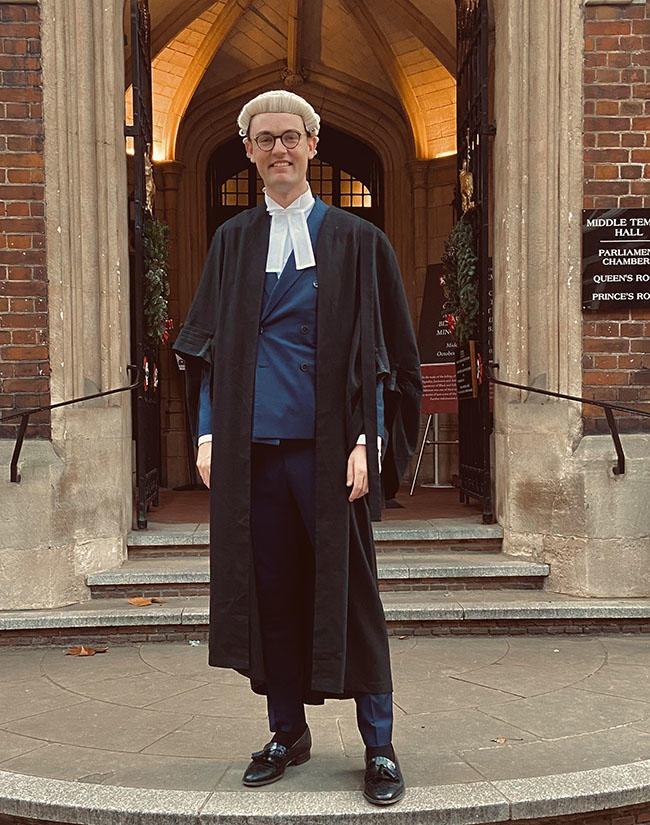Jack Best
Having wanted to be a barrister for as long as he can remember, Jack Best is now on course to his dream career, and he believes his time studying at the University of Worcester gave him a head start on that journey.

Less than three years after leaving Worcester, Jack is undertaking a pupillage specialising in family law at St Philip’s Chambers, Birmingham, training him to practise in his chosen profession.
Jack was among the first cohort to graduate from the University’s new Law degree in 2019 and the first ever alumni to obtain pupillage. He was one of five selected by St Philip’s Chambers when applying in his first round. In some cases, pupillage providers can see over 1,000 applications, meaning many law graduates find themselves reapplying up to five years after completing their post-graduate training in the hope of getting accepted.
“If you want a head start to a successful legal career then studying Law at the University of Worcester will give you that,” he said. “Even though my career is in its infancy, achieving pupillage, given how difficult that is, is something that can be accredited to that head start. I think the hard work and the support offered has enabled me to make the most out of what a legal career has got to offer.”
Having started his pupillage in October 2021, Jack is enjoying the experience. “It’s great,” he said. “It’s one of those jobs where you are constantly learning and adapting. The law is constantly changing, so the skills learnt on your undergraduate studies, such as research and the theory of law, are vital to understand those changes quickly in practice.”
Jack completed the BPTC (Bar Professional Training Course) in Birmingham following his degree. “I have wanted to be a barrister for as long as I can remember,” said the 24-year-old. “I like the challenge of a legal problem. Barrister’s work can be very complex, but in its rawest form it is being able to further a persuasive argument. I like the challenge of arguing a legal problem against an opponent. With family law, I particularly enjoy being able to build a connection with my clients because family law proceedings are often extremely emotional and difficult.”
Having switched from studying Law elsewhere, Jack said he loved how at Worcester he felt part of the university community and his cohort, despite not living on campus.
He particularly liked the small class sizes. “They weren’t overcrowded, so you could really have a discussion with your lecturers,” he said. “It’s still a small law school in comparison to other places, which was what I liked about it. It means everybody can develop those skills quicker than if you’re in a lecture hall of 400 people. I found the engagement of students in lectures and seminars to be really helpful. With other universities you don’t actively engage in a lecture, you just listen.”
Jack said that the practical element of the degree was very important to him when choosing where to study law, whether that was a mock client conference or a moot court hearing. “Developing these interpersonal skills at Worcester has definitely helped me,” he said. “Having to be assessed on those practical elements was so helpful because that’s what the legal profession looks like. It’s applying the law to a scenario. A client doesn’t want to know how and why the law became the law, they want to know how it affects them and what their outcome could be. Getting the balance right between knowing the theory of the law and applying that to the practical approach in a scenario meant I was better equipped for the Bar and pupillage because I’d already started developing those skills at Worcester. The skills learnt during my undergraduate studies built my confidence and put me at an advantage at both bar school and pupillage interviews.”
When applying for the BPTC, staff helped Jack prepare for legal scenarios in the application selection process, which he said exemplified the level of personal support from academics. “The lecturers knew your name and you knew theirs, which meant that the open door policy was so much more friendly,” he added. “You didn’t have to book an appointment. That’s why I thrived because I was able to knock on the door and say, ‘I don’t understand’.
“Also, the lecturers were all professionals, one having been a practising barrister. To be taught by legal professionals who have got an insight into the legal profession means they’re best placed to give you reliable and realistic advice, especially on developing a career in law. If I hadn’t been so well supported and had chosen a different university to study law, I might not have been able to have the experience I had or be in the position I am in today.”
Jack regularly gives talks to students at Worcester to offer advice so they can follow in his footsteps.